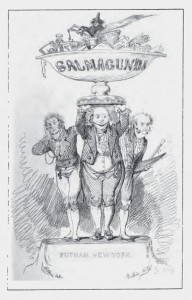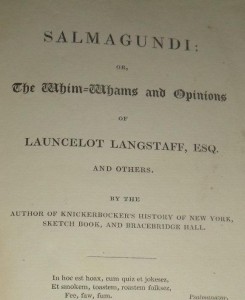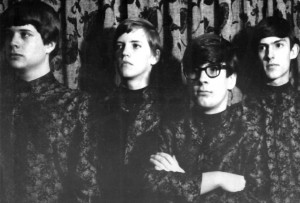I bought a book and some work today. One of those eBay auctions that seemed appealing at the moment. You find yourself with the winning bid and then wonder: What was I thinking?
Obviously, I love books. History, too. Put me in front of historical old books and I’m like a kid in a candy store.
The auction? A book from 1824 written by Washington Irving under the pen name Launcelot Longstaff. Salmagundi was a periodical written between 1807 and 1808 by Irving and his brother, along with another fellow. They were poking fun at New York and New Yorkers like the satirical Mad Magazine does. Irving’s publisher took the stories from his periodicals and turned them into a book.
Washington Irving has come up several times in the course of my research work, although I’m not sure why that is. Once, I was trying to track down an oil painting for someone and there were indications the artwork was owned by the museum at Irving’s New York state home. (They couldn’t find it, but I think the curator enjoyed the hunt as much as I did…)
Somewhere along the line I had learned that Irving entered (what was then) Indian Territory as part of a western tour. The 1832 Henry Ellsworth expedition passed directly through areas along the Arkansas River where Broken Arrow and Bixby were later founded. In fact, Bixby has remembered the tour with its Washington Irving Memorial Park and Arboretum, just north of the river bridge on Memorial.
So, my little auction-find pre-dates his visit to Oklahoma. The fact that the book was published during Irving’s lifetime is a major bonus.
The “work” part of the purchase? The rebinding that will be required to put it back into presentable shape.
Besides the bidding and buying, these book adventures represent the possibility of learning something new. This auction-win came through on that account as well.
In trying to figure out what the title of the book made reference to, I learned that Washington Irving was also behind the New York terms “knickerbocker” (as in New York Knicks), and “Gotham” (often rendered as Gotham City). The title “Salmagundi” is a word representing a “mish-mash” or “wide variety.” Irving’s periodical was obviously well-named, even if obscurely so. Diedrich Knickerbocker was another Irving pen name. I knew that one, but didn’t know that it was in his Salmagundi periodical that Washington Irving poked fun at New Yorkers and suggested their intellectually-challenged nature was just the same as the knuckleheads who lived in Gotham, Nottinghamshire, England.
You never know what terms and phrases will stick.
But, I’m guessing most NBA Knicks fans and Batman-Gotham City aficionados don’t know the reason those terms are in use. (I suppose I shouldn’t feel smug about it, since I only just learned it today.)
So much for this salmagundi of non-essential information…
Come visit!
McHuston
Booksellers & Irish Bistro
Rose District
122 South Main St. Broken Arrow OK!



